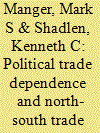| Srl | Item |
| 1 |
ID:
105890


|
|
|
|
|
| Publication |
2011.
|
| Summary/Abstract |
Neodevelopmental patent regimes aim to facilitate local actors' access to knowledge and also encourage incremental innovations. The case of pharmaceutical patent examination in Brazil illustrates political contradictions between these objectives. Brazil's patent law includes the Ministry of Health in the examination of pharmaceutical patent applications. Though widely celebrated as a health-oriented policy, the Brazilian experience has become fraught with tensions and subject to decreasing levels of both stability and enforcement. I show how one pillar of the neodevelopmental regime, the array of initiatives to encourage incremental innovations, has fostered the acquisition of innovative capabilities in the Brazilian pharmaceutical sector, and how these new capabilities have altered actors' policy preferences and thus contributed to the erosion of the coalition in support of the other pillar of the neodevelopmental regime, the health-oriented approach to examining pharmaceutical patents. The analysis of capability-derived preference formation points to an endogenous process of coalitional change.
|
|
|
|
|
|
|
|
|
|
|
|
|
|
|
|
| 2 |
ID:
078837


|
|
|
|
|
| Publication |
2007.
|
| Summary/Abstract |
This article examines the relationship between intellectual property (IP) and public health, with a focus on the extension of AIDS treatment in the developing world. While most of the literature on IP and health examines the conditions affecting poor countries' capacities to acquire essential medicines, I show the distinct-and more complicated-political economy of production and supply. IP regulations alter the structure of generic pharmaceutical sectors in the countries capable of supplying essential medicines, and changes in market structure affect actors' economic and political interests and capacities. These new constellations of interests and capacities have profound implications for the creation and maintenance of political coalitions in support of on-going drug supply. The result is that the global AIDS treatment campaign becomes marked by mismatches of interests and capacities: those actors capable of taking the economic, legal, and political steps necessary to increase the supply and availability of essential drugs have diminished interest in doing so, and those actors with an interest in expanding treatment may lack the capacities to address the problem of undersupply. By focusing centrally on actors' interests in and capacities for economic and political action, the article restores political economy to analysis of an issue-area that has been dominated by attention to international law. And by examining the fragility of the coalitions supporting the production and supply of generic drugs, the article points to the limits of transnational activist networks as enduring agents of change.
|
|
|
|
|
|
|
|
|
|
|
|
|
|
|
|
| 3 |
ID:
131000


|
|
|
|
|
| Publication |
2014.
|
| Summary/Abstract |
Why do developing countries negotiate North-South trade agreements, when they already enjoy preferential market access to developed-country markets? Most developing countries benefit from the generalized system of preferences (GSP) and related schemes when they export to the United States, the EU, and other developed economies. And yet, many pursue fully reciprocal agreements that require major concessions to the developed partner. We argue that this is due to the nature of the GSP as a unilateral concession that can be (and often is) taken away. High dependence on unilateral, removable preferences generates "political trade dependence" (PTD). We distinguish PTD from standard measures of trade dependence, and we explain why PTD motivates developing countries to seek North-South Regional Trade Agreements (RTAs). We show the effects of PTD with a selection of illustrative cases and test our hypothesis on a data set of EU and US trade agreements with developing countries. We find robust statistical support for our hypothesis that high and rising levels of PTD make the negotiation of a North-South RTA more likely.
|
|
|
|
|
|
|
|
|
|
|
|
|
|
|
|